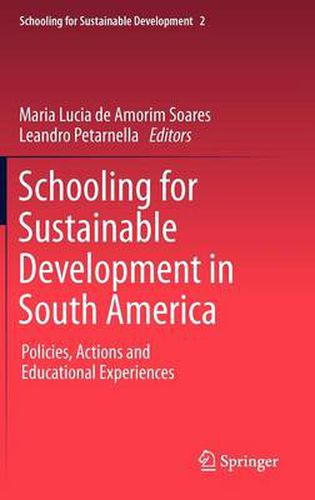Readings Newsletter
Become a Readings Member to make your shopping experience even easier.
Sign in or sign up for free!
You’re not far away from qualifying for FREE standard shipping within Australia
You’ve qualified for FREE standard shipping within Australia
The cart is loading…






This title is printed to order. This book may have been self-published. If so, we cannot guarantee the quality of the content. In the main most books will have gone through the editing process however some may not. We therefore suggest that you be aware of this before ordering this book. If in doubt check either the author or publisher’s details as we are unable to accept any returns unless they are faulty. Please contact us if you have any questions.
This book supplies both empirical evidence and scholarly analysis that exemplify successful innovation in South America in the field of sustainability education. Examining the issues from a three-fold perspective, of national policy, regional planning and grassroots projects in schools and communities, the volume offers a comprehensive overview of the contemporary situation in Brazil, Chile, Bolivia, Argentina and Venezuela. It provides case studies as detailed illustrations of the recipe for success as well as to inform researchers and practitioners of the kinds of obstacles and challenges they might face in seeking to manifest sustainability.
A good deal of the research and scholarly studies in the field of education for sustainability and sustainable development is underpinned by ‘Western’ norms and culture. This book draws on that literature, yet also teases out features in the case studies that are particular to the region. South America itself encompasses a rich variety of natural and cultural environments-within individual nations as much as continent-wide. This diversity is a recurring theme in the book.
The volume’s three sections provide first a general survey, enriched with material from studies conducted in a number of different polities. The second section covers developments in Brazil, South America’s largest nation and one that exhibits many of the features of education for sustainability found across the continent. Part three sets out and explores future trends. As with other books in the Schooling for Sustainable Development series, this volume will add impetus to scholarly exchange as well as contributing insights on education policy and curriculum changes across South American communities that exist in an increasingly globalized world.
$9.00 standard shipping within Australia
FREE standard shipping within Australia for orders over $100.00
Express & International shipping calculated at checkout
This title is printed to order. This book may have been self-published. If so, we cannot guarantee the quality of the content. In the main most books will have gone through the editing process however some may not. We therefore suggest that you be aware of this before ordering this book. If in doubt check either the author or publisher’s details as we are unable to accept any returns unless they are faulty. Please contact us if you have any questions.
This book supplies both empirical evidence and scholarly analysis that exemplify successful innovation in South America in the field of sustainability education. Examining the issues from a three-fold perspective, of national policy, regional planning and grassroots projects in schools and communities, the volume offers a comprehensive overview of the contemporary situation in Brazil, Chile, Bolivia, Argentina and Venezuela. It provides case studies as detailed illustrations of the recipe for success as well as to inform researchers and practitioners of the kinds of obstacles and challenges they might face in seeking to manifest sustainability.
A good deal of the research and scholarly studies in the field of education for sustainability and sustainable development is underpinned by ‘Western’ norms and culture. This book draws on that literature, yet also teases out features in the case studies that are particular to the region. South America itself encompasses a rich variety of natural and cultural environments-within individual nations as much as continent-wide. This diversity is a recurring theme in the book.
The volume’s three sections provide first a general survey, enriched with material from studies conducted in a number of different polities. The second section covers developments in Brazil, South America’s largest nation and one that exhibits many of the features of education for sustainability found across the continent. Part three sets out and explores future trends. As with other books in the Schooling for Sustainable Development series, this volume will add impetus to scholarly exchange as well as contributing insights on education policy and curriculum changes across South American communities that exist in an increasingly globalized world.